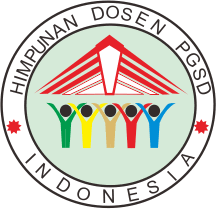Analisis dampak pembelajaran daring pada keterampilan membaca pemahaman cerita fiksi peserta didik kelas iv sekolah dasar
Abstract
This study aims to describe the analysis of the impact of online learning on reading comprehension skills. This research uses descriptive qualitative research methods. The subjects of this study were fourth grade students of SD Negeri 6 Parakan. Research data collection is done through data collection techniques of observation, interviews and document studies. The data analysis technique uses the Miles and Huberman model which consists of data reduction, data presentation and conclusion drawing. The results showed that the fourth grade students of SD Negeri 6 Parakan in analyzing reading comprehension skills in fiction stories were still less successful in obtaining reading information, explaining the intrinsic elements of reading, drawing conclusions from the reading, and determining statements that were in accordance with the contents of the reading. from reading. Constraints in reading comprehension skills are the students' lack of interest in reading, lack of reading facilities and the role of parents. The solution to these problems is to foster students' interest in reading, improve reading facilities both at school and at home, and get used to reading from an early age by parents.
Keywords
Full Text:
PDFReferences
T. A. Widiastuti, I. R. W. Atmojo, and D. Y. Saputri, 2021. “Profil Keterampilan Berpikir Kreatif Peserta Didik dalam Pembelajaran IPA Kelas V di Sekolah Dasar,” Didakt. Dwija Indria, 9(3) 4–9,[2] A. Sadikin and A. Hamidah, 2020. “Pembelajaran Daring di Tengah Wabah Covid-19,” Biodik, 6(2) 09–119,[3] J. Gikas and M. M. Grant, 2013. “Mobile computing devices in higher education: Student perspectives on learning with cellphones, smartphones & social media,” Internet High. Educ., 19 18–26, [4] M. A. S. Enriquez, 2014. “Students ’ Perceptions on the Effectiveness of the Use of Edmodo as a Supplfile:///C:/Users/user/Downloads/49030-130249-1-PB.pdfementary Tool for Learning,” DLSU Res. Congr., pp. 6–11[5] F. Rahim, 2008. Pengajaran Membaca di Sekolah Dasar.(Jakarta. Bumi Aksara)[6] N. K. D. Tristiantari and I. M. Sumantri, 2016. “Model Pembelajaran Cooperatif Integrated Reading Composition Berpola Lesson Study Meningkatkan Keterampilan Membaca Dan Menulis,” JPI (Jurnal Pendidik. Indones., 5(2) 203, [7] A. Jalilifar, 2010 “The effect of cooperative learning techniques on college students’ reading comprehension,” System, 38(1) 96–108.[8] R. Kurniawati, 2012 “Kemampuan Membaca Pemahaman Siswa Kelas XII SMA di Surabaya,” J. Bhs. dan Sastra Indones., 1(1) 9..[9] Aminuddin, Pengantar Apresiasi Karya Sastra. Bandung: Sinar Baru Algensindo, 2013.[10] N. M. S. Aryandani, 2021, “Hubungan Minat Baca Dan Peran Orang Tua Di Masa Pandemi Covid-19 Terhadap Keterampilan Membaca Bahasa Indonesia Siswa Kelas V Sd Gugus I Kecamatan Selemadeg Timur Tahun Ajaran 2020/2021,” Skripsi. [11] L. R. Elisabeth, 2020, “Peningkatan keterampilan membaca pemahaman menggunakan model pembelajaran scramble wacana pada siswa kelas IV,” Didakt. Dwija Indria, 8(5). 1–5[12] N. W. U. R. Dewi, N. M. Asril, and D. G. F. Wirabrata, 2021. “Meningkatkan Kemampuan Berhitung Permulaan pada Anak Usia Dini Melalui Video Animasi,” J. Pendidik. Anak Usia Dini Undiksha, 5(1) 99–106.[13] B. Nurgiyantoro, Teori Pengkajian Fiksi. Yogyakarta: Gajah Mada University Press, 2009.[14] M. B. Miles, A. M. Huberman, and J. Saldana, 2014. Qualitative Data Analysis, A Methods Sourcebook, Edition 3., 3rd ed. (USA: Sage Publications.)[15] S. Al Musthafa and V. Mandailina, 2018. “Meningkatkan Kemampuan Berhitung Siswa Sd Menggunakan Metode Jarimatika,” JCES | FKIP UMMat, 1(1) 30, doi: 10.31764/jces.v1i1.71.[16] S. Somadayo, 2011, Strategi dan Teknik Pembelajaran Membaca. (Yogyakarta: Graha Ilmu).[17] H. N. E. Safitri, S. Y. Slamet, and T. Budiharto,2021. “Kemampuan membaca pemahaman ditinjau dari minat membaca dan penguasaan diksi peserta didik kelas IV sekolah dasar,” Didakt. Dwija Indria, 9(5) [18] R. Romafi and T. Musfiroh, 2015 “Hubungan Minat Membaca, Fasilitas Orang Tua, Dan Pemberian Tugas Membaca Dengan Kemampuan Membaca Pemahaman Siswa,” LingTera, 2(2) 185, , doi: 10.21831/lt.v2i2.7377.[19] A. R. Anisa, A. A. Ipungkarti, and K. N. Saffanah, 2021. “Pengaruh Kurangnya Literasi serta Kemampuan dalam Berpikir Kritis yang Masih Rendah dalam Pendidikan di Indonesia,” Curr. Res. Educ. Ser. J., 1(1) 1–12.[20] M. Hardjoprakosa, Bunga Rampai Kepustakawanan. Jakarta: Perpustakaan Nasional RI, 2005.[21] S. Kasiyun, 2015. “JURNAL PENA INDONESIA (JPI) Jurnal Bahasa Indonesia, Sastra, dan Pengajarannya,” J. Pena Indones., 1(1),79–95.
Refbacks
- There are currently no refbacks.



